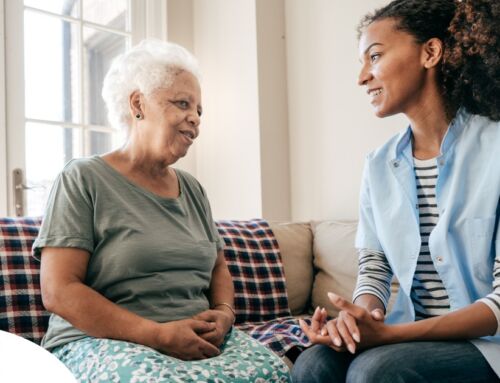Pleasure and joy are not limited to the younger generation, so why do we see stereotypes of the “grumpy older person”? Do we tend to become more cynical as we age, or do we just forget how to have pleasure in our lives? Or worse yet, believe there is nothing left to feel joy over?
In a research paper published in September of 2020, research showed that happiness and joy tends to move up and down, then falling strongly about the age of 50 years old. Then it rises again until approximately the mid-60s.
Strangely enough, around our mid-60s, the data shows that there become two distinct groups, one that gets noticeably happier with increased age and one that gets less happy. Why is that and what can we do to change that?
Defining pleasure and joy
When we’re young, we derive pleasure from the smallest things. A snowflake landing on our tongue, a parent’s warm embrace, the lick of a puppy. As we age, we get pleasure from larger things, accomplishing a challenging task, admiring art, listening to music.
But as we grow older, we may become cynical, feeling as though we have experienced all that there is in life. Perhaps we become creatures of habit and leave adventure behind. Perhaps life has been difficult and painful. But what many people fail to understand is that having joy and experiencing pleasure is all perspective.
Why is pleasure in life important?
The Huffington Post indicates, “… research shows that joyful people have less chance of having a heart attack, healthier blood pressure, lower cholesterol, weight management, and decreased stress levels. Also, studies show that happy people are more likely to exercise, eat healthy foods, sleep better and avoid smoking.”
How do I increase my pleasure in daily life?
Laughter It’s been proven time and again that laughter really is the best medicine. It releases endorphins, which make us feel better and even reduce pain. Pop in your favorite funny movie or stand up comedy for a little joy.
Social interaction Spending time with family, friends, partners or other loved ones is good for us. Not only does it help to fend off the feelings of isolation, people who we love tend to help pull us out of our shells and can lend a deep satisfaction and level of pleasure in life.
Focus on abilities Understanding that most of life is perspective, older adults who focus on what they can do feel generally better mentally than the people who focus on what they can’t do.
Rediscover your personal interests As we navigate our lives, there are often hobbies or other interest and activities that we “put down” or stopped doing because we got busy and didn’t have time. Remember how much you loved to paint? (Or get lost in a good book, or scrapbook, or woodwork, or…you get the picture.)
Get a little physical! Those of us who move our bodies, to whatever capacity we’re able, are generally happier and have better physical and mental health. Check out some of our previous articles on how to get moving:
- Why Bother Starting an Exercise Habit After 65?
- 11 Marvelous Benefits of Walking
- 8 Best Workouts For Adults Over 55
- 6 Reasons You Should Be Weight Training
Enjoy the little things Just because we’re older doesn’t mean there aren’t joyful things happening around us every day. Look for the positive aspect of even the most mundane daily activity. For example, joy and pleasure can be found in:
- Noticing the vibrant colors of nature
- Appreciating when a stranger is kind to someone
- Staying in the present moment
- Noticing and enjoying experiences with food
- Develop a skill of gratitude and stopping to really feel it
- Listen – to music, to friends, to the birds, when someone tells you they love you
Wrap Up
Finding joy and pleasure in life (at any age) isn’t difficult. We must feel that we deserve it and then just stop and notice all the wondrous things around us. Beauty is indeed in the eye of the beholder.
~ ~ ~
Do you have questions about how you can better support your loved one while they age in place in South Florida or regarding homecare in general? Please contact CareGivers of America here: Contact or call us toll free: 800-342-4197
To join our amazing mailing list where you’ll receive special content, click here.
*No information in this article is to be taken as advice, medical or otherwise. This post is not sponsored, but may contain external links to websites, articles or product examples. External links are used for example or reference purposes only and these links do not indicate specific product or website endorsement by CareGivers of America.







